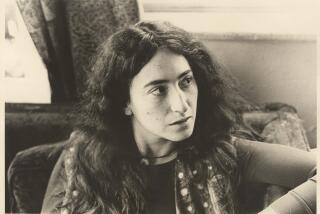A Domestic Drama of Pain and Growth : HOPE’S CADILLAC by Patricia Page; W.W. Norton $25, 334 pages
- Share via
“Hope’s Cadillac,” Patricia Page’s accomplished first novel, tracks the life of a 28-year-old Houston homemaker and mother of two, Hope Fairman, through the late ‘60s and early ‘70s. The Vietnam War is escalating, consciousness is rising; black power, free love, student protests, hippies and high times are in their heyday and Hope’s family is falling apart.
To some degree, this is a novel of the political made personal. Hope’s beloved brother William has gone underground and out of touch to avoid the draft. Hope breaks with her parents over her mother’s racism. Hope’s involvement in the era’s radical religious and educational experimentation also deepens and exacerbates the inherent incompatibility in her marriage.
But “Hope’s Cadillac” is no polemic. It is much more a domestic drama of divorce, custody battles, a woman’s personal devastation and growth. As such, the novel fits snugly into the niche of contemporary domestic fiction as practiced by such writers as Jane Hamilton and Alice Adams.
As the novel opens, Hope has been married for a decade to an uptight engineer and is fighting “drift,” a condition she and her best friend Chloe describe as “the sense they’d had of floating on their lives rather than living them.” Hope has taken yoga and photography classes, joined an offbeat Unitarian church and helped establish an alternative free school on the church grounds. Like the emotion she’s named for, however, Hope often ignores the signals reality sends her way.
What will spur Hope to change is a leveling dose of personal loss. First, her husband, Clay, leaves her for another woman. Then, just as Hope recovers some pluck (not to mention a boyfriend), Clay sues for custody and, rather unbelievably, wins.
As the loss of her children sets in, Hope sells her suburban home and moves into Communitas, a commune created by her minister.
Hope’s housemates include her gentle lover, Victor; Fern, an airhead hippie mother; a folk-singing duo named Finn and O’Molly; and Alex, the far-out Unitarian minister.
What saves the book from being a bestiary of ‘60s types is Page’s intelligence and even-handedness as a writer. Although she’s prone to the broad comic stroke--Fern cries for a week when Janis Joplin dies--Page’s characters are made fully human through specificity of detail and the writer’s compassion.
Page never takes them to the easy places. Clay may be the least likable character, but his love for his children is never doubted and, late in the book, when he cannot deny that he is no happier with his tidy, controlling new wife, it’s obvious that he’s been groping through darkness like everyone else.
Alex seems a parody of liberal religious faith gone off the deep end, but again, as he takes misstep after misstep, his story acquires an inexorable tragic momentum. And Hope makes some serious misjudgments, blows some big moments (in court, no less), and never really loses an irritating dimness even as she finds a revived interest in life, a new appreciation of sex, better judgment about men and eventually enough strength to go back and fight for her children.
Those readers drawn into Hope’s story will find such a quibble insignificant beside far larger pleasures. Page’s scope and ability are impressive: She renders an era, a city and a large cast of lively characters with uncanny insight and high humor.
More to Read
Sign up for our Book Club newsletter
Get the latest news, events and more from the Los Angeles Times Book Club, and help us get L.A. reading and talking.
You may occasionally receive promotional content from the Los Angeles Times.










